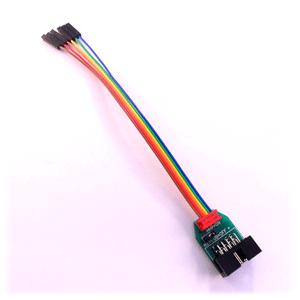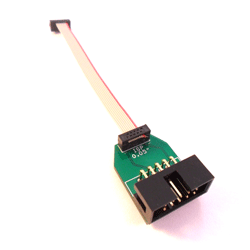To carry out In System Programming (ISP) of devices, such as AVR, ST7 and PIC microcontrollers or serial EEPROMs, you need an ISP connector on your PCB that matches the format on the programmer you intend to use, but this isn’t always that simple.
The semiconductor manufacturers haven’t helped. Atmel’s AVR recommended ISP header has changed from 10-way (5×2) to 6-way (3×2) while Microchip haven’t bothered with PIC at all, except to use RJ11 connectors on their development tools like IDC3. RJ11 connectors are huge and unsuitable for most applications. Other Microchip tools eg PICKit3 or PICkit4 use 6-way (6×1) pin headers but no pin order is defined. This means that PIC programmers tend to come with flying leads so that you can connect them in the required order, not ideal for documentation and passing the programmer on to other people.
Kanda already supply a range of adapters to convert our standard 10-way programmer headers to other formats, such as RJ11, 6-way micromatch, JTAG and flying leads but we have also made many custom adapters for customers including edge connectors, 5 and 6-way pin headers and connectors with extra long pins.
6-way Flying Lead Adapter

The latest trend is towards smaller pitch connectors, 1.27mm or 2.0mm rather than standard 2.54mm (0.1″) connectors. Atmel ICE for example, the latest debug tool for AVR (and SAM) microcontrollers, has 10-way 1.27mm connectors but converters to 2.54mm (0.1″) are thin on the ground. Kanda will be making these soon.
If your board already has 1.27mm or 2mm ISP connectors, Kanda have a range of adapters for all our programmers to both 6 and 10-way small pitch connectors – see link below. These small pitch connectors save space on your PCB but are much more expensive than standard pitch ones.
1.27mm 10-way ISP connector

Many people are constrained in their ISP header design by company policy, the output connector on development tools or the need to connect to third party equipment with a different ISP format. If you need a custom adapter for whatever reason, please contact support.
We have a list of our standard headers, custom designed headers and ATE (Automated Test Equipment) interfaces here, ISP Headers
